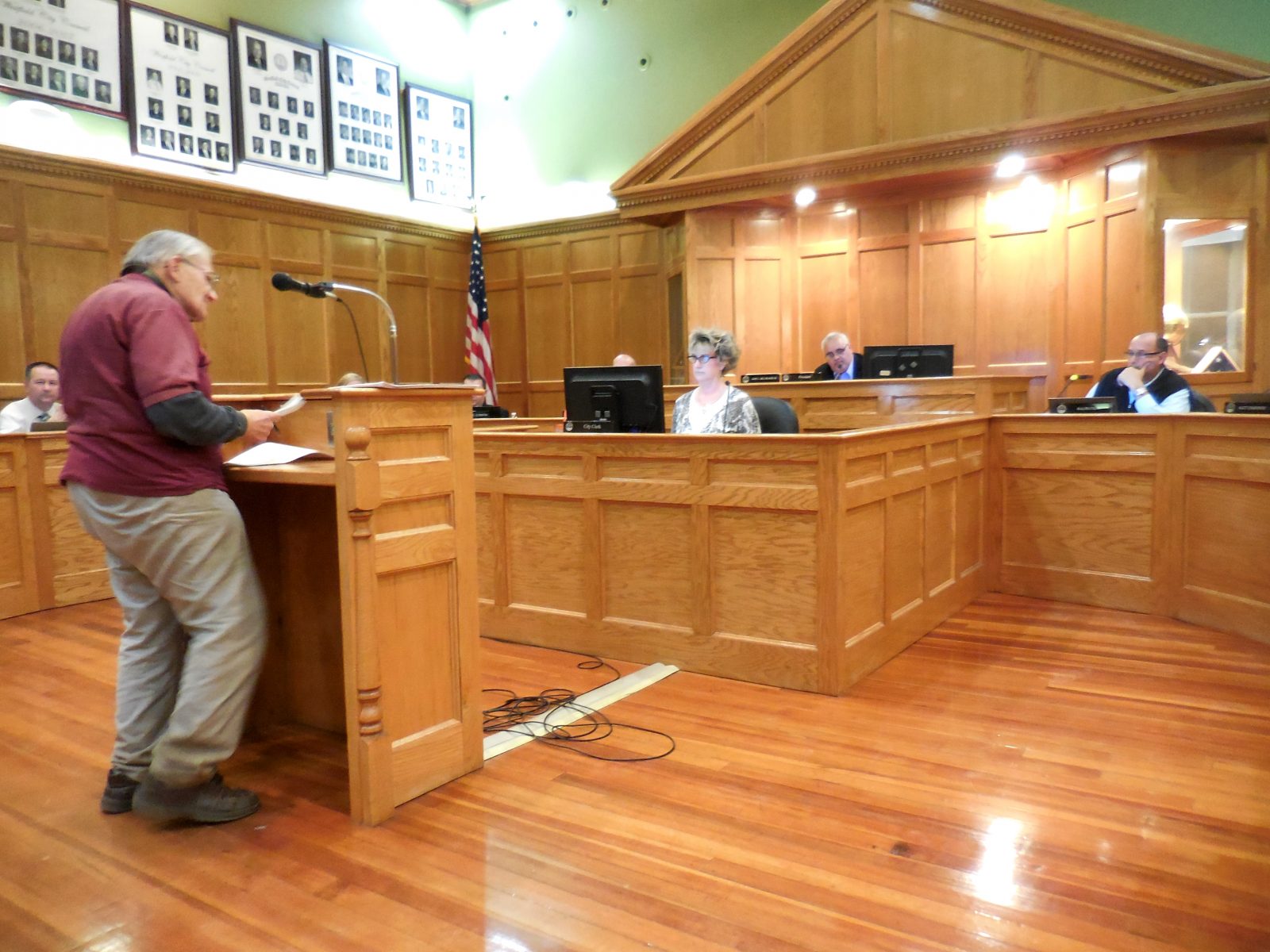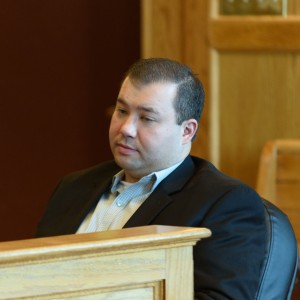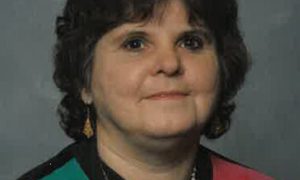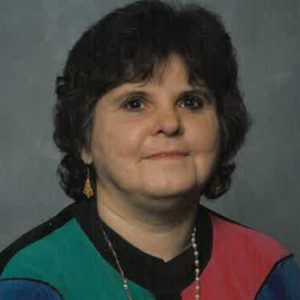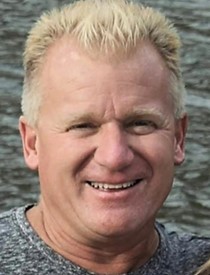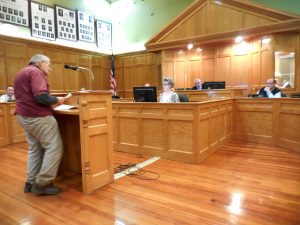
Matthew Roman gave a report from the “Senior Snoopers” during public participation at Thursday’s City Council meeting. (Photo by Amy Porter)
WESTFIELD – On Thursday, the City Council approved several items brought forth from Mayor Brian P. Sullivan, and heard reports from committees.
Items acted on from the Mayor included unanimous acceptance of another incentive payment from the Westfield Gas and Electric in the amount of $11,567 for the Green Communities cooler/freezer school projects. At a prior meeting, the Mayor explained that the incentives were for several energy projects to be done around the city for the Green Communities grant of $266,000 which the City Council had approved on July 6. He said the Westfield G&E had done a concurrent study and was offering the incentive to encourage the energy savings. Sullivan said none of the money for the projects would be coming from the general fund.
The Council also approved on immediate consideration a $300 transfer to the License Commission for paper to print the licenses.
A transfer of $54,891 within the Police Department to purchase a 2018 Ford Edge for an unmarked detective bureau vehicle and a 2018 Transit Connect Van for an Animal Control vehicle were referred to the Finance sub-Committee. Sullivan said there may be enough funds left over to get another line vehicle at the end of the fiscal year. Also referred to Finance was an authorization to use the remaining appropriation of $1,800 from the PEG funding for Internet and Fiber for general PEG expenses.
The Finance sub-Committee brought several items from the Mayor back to the Council with 3-0 recommendations for funding that were unanimously approved. These included a transfer of $1,806 from the FY18 Public Works Wastewater Division, and $2,450 from the DPW Water Division to pay prior year bills that were not received by the end of the fiscal year.
Also approved was an appropriation of $28,750 to pay the first half (6-months) salary of a one-year position for the PEG Access. Later in the meeting, the Council approved the appointed of Peter Cowles in the position of Media Specialist for the city.
The motion of Councilors Andrew K. Surprise and Dave Flaherty to establish a Special Purpose Stabilization Fund for roads and sidewalks was discussed, although it remains in the Finance sub-Committee. The goal of the fund is to earmark the money from the Meals Tax and Room Occupancy Tax for the new fund.
Flaherty said the Council has created stabilization accounts in the past, for OPEB (Other Post-Employee Benefits) and Park Square Green, which he said is the right of the legislative branch. He said regarding the philosophy/question of whether this is micro-managing the Mayor, “We do this all the time. This is a nice clean way to do it. This money would come into this stabilization fund,” Flaherty said.
“I would hope the Finance Committee would request from the Mayor a breakdown of funds from Meals Tax and Lodging,” said Ward 2 Councilor Ralph J. Figy.
At-large Councilor Brent B. Bean, II agreed, adding that he’d like to see proof that it wasn’t used for that purpose. “I get concerned about earmarking,” Bean said.
“I think we’re getting too far down into running the city on a micro-management level. I think whomever is the Mayor will make good use of the funds,” said Ward 5 Councilor Robert A. Paul, Sr. He said once the legislative branch gets into how and where it will be spent, then the next thing is to request an audit, which creates more bureaucracy on a couple of hundred thousand bucks. “It makes sense when you need a large amount, like for sewers,” he said.
“This is a tool the state encourages us to use. It makes sense. If we create a funding source that renews every year, then we can plan on which roads (to be repaired),” said Surprise.
“I trust the city will do what it earmarks how the taxes are spent. You might say it won’t be. I’m convinced,” said Paul.
“If the money’s in stabilization, that’s half a million a year – no downside. Other than the ability to misuse the dollars,” said Flaherty.
The first item from the Legislative and Ordinance Committee was the motion by former Councilor Stephen Dondley to explore the possibility of taking legal action to seek damages from pharmaceutical manufacturers and distributors of opioids. Figy, who chairs L&O, said the city’s Law Department is monitoring this close, and if and when it’s time will jump on a class-action lawsuit. “They will be happy to do so,” Figy said.
L&O also recommended approval of the West Farms one-room schoolhouse from the control of the Westfield School Department to the Historical Commission. The Council voted to approve, and it will go to a second reading at the next meeting. The Council also authorized the Mayor on a recommendation from L&O to execute a development agreement for the Springfield Road Traffic Signalization Project.
Ward 1 Councilor Mary Ann Babinski gave a status report on the Water Resource Protection District ordinance from the Natural Resources Committee, which she chairs. Babinski said they are determined to strengthen the ordinance, and will keep it in a committee. She said they are close to a draft for the Council.
Bean asked her how old the maps of the Aquifer are, and Paul said it was a good question. “Things move,” he said. Several councilors agreed that a new GIS map would be helpful. Babinski invited them to the next sub-committee meeting on Jan. 29 at 6:30 in Room 315.
New motions at the meeting included one by Councilors Dan Allie, William Onyski, Paul, Nicholas J. Morganelli, Jr., Surprise and Flaherty to strengthen the abutter notification ordinance. Allie said they are looking to increase the notification distance to 500 feet in the ordinance which the Council passed last June, and to add all residents. He said interested parties may submit a letter asking to be notified.
Figy said in order to amend an ordinance; a form from the Planning Board needs to be filled out. The matter was referred to Zoning, Planning and Development.
A second motion by Councilors Matt Emmershy, Onyski and Surprise requesting the City Properties Committee to account for and evaluate all City-owned Real Estate was also presented. “The city, lately it seems, has gotten into the real estate business, far more than it should. We decided to take a look at this. We’re sitting on city properties. It’s time to evaluate and move on some of those properties,” Emmershy said.
“I think it’s a great idea. Unfortunately, I don’t think it’s a whole heck of a lot,” said Bean. He said this would also be a topic on the Business Development committee, on which he serves. The matter was referred to City Properties.
Ward 4 Councilor Michael J. Burns also presented two motions, co-sponsored by Bean and Paul. The first was to allow the Board of Public Works to set the sewer rates for the city, rather than the City Council.
Burns said as a long-time member of the Water Commission, this has become a “political football.” He said it should be in Public Works.
“I agree with the Councilor, this does become an issue. I’d rather have the experts dictate what we do or do not need,” Bean said.
“It’s a great opportunity to get the experts on this,” Emmershy agreed. He said there had been an online discussion about why water rates were based on usage, but sewer was a flat rate. Paul also said it was good to see it brought forward. “It’s the right time for it,” he said.
“This is giving up power the City Council has. People don’t want the sewer rate to go up,” said Surprise.
“I’m not in favor of it. The people elect us to set rates and taxes. I don’t see there’s a real reason for this,” Flaherty said.
Paul said that septic systems are in the Top 5 concerns regarding the aquifer. He said Councilors don’t know how many septic systems there are, which are failing, and whether the pumping stations are working well. “We’re not the right ones to do that. Give the infrastructure management. We’ve got to get people worried about this every day,” Paul said.
“I think this is a good first step in (getting away from) having the city micro-managed on a lot of projects. I think we need to start as a whole moving these things to the experts who do this all the time,” Onyski said.
“This is a rate generator questions. The DPW can come in and give us a recommendation,” Flaherty said. The motion was moved to L&O and Legal.
Burns next motion to combine the Water Commission and the Board of Public Works into one board, was also referred to L&O and Legal with no discussion.
Figy reminded his colleagues that all orders, ordinances and resolutions need to go through L&O.

